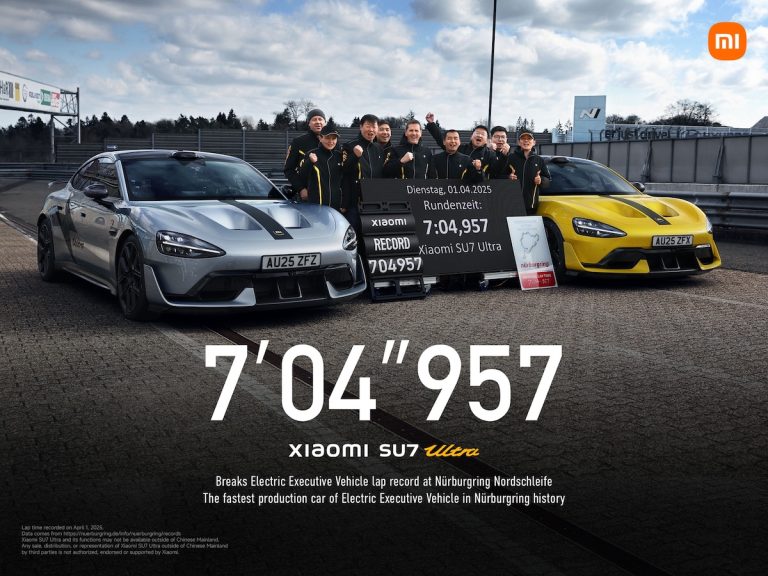MANILA, Philippines (Jun 2025) – Chinese tech giant Xiaomi just made history on one of the world’s most punishing racetracks. The company’s SU7 Ultra electric sedan blazed around Germany’s notorious Nürburgring Nordschleife in just 7 minutes and 4.957 seconds, smashing the record for fastest electric executive vehicle.
The achievement marks a major milestone for electric vehicle technology, proving that battery-powered cars can compete with traditional supercars on the most demanding circuits. Xiaomi accomplished this feat on their very first attempt at the legendary 20.8-kilometer track, known as “Green Hell” for its difficulty.
What makes this run even more impressive is the sheer power behind the SU7 Ultra. The production model packs three electric motors – two V8s and one V6s – delivering a combined 1,548 horsepower. That’s enough juice to rocket from zero to 100 kilometers per hour in under two seconds and push the top speed beyond 350 km/h.
The record-breaking performance stems from what Xiaomi calls its “three core electric technologies” covering the motor, battery, and control systems. Add advanced chassis torque-vectoring and aerodynamic tweaks, and you get a machine built for speed.
This isn’t just a one-off publicity stunt either. Xiaomi has deepened its partnership with Nürburgring, becoming a premium partner with access to the facility’s test and development program. The company even got its own “Xiaomi Curve” added to the Grand Prix track.
For Filipino car enthusiasts, this showcases how Asian tech companies are pushing the boundaries of automotive performance. While Xiaomi phones are already popular in the Philippines, seeing the brand dominate on the racetrack adds a new dimension to their reputation.
The timing couldn’t be better as electric vehicles gain traction globally. Countries worldwide are shifting toward cleaner transportation, and records like this prove EVs don’t mean sacrificing performance for environmental responsibility.
Xiaomi’s racing success also highlights the company’s evolution from smartphones to a comprehensive tech ecosystem spanning cars, homes, and personal devices. Their “Human × Car × Home” strategy aims to seamlessly connect all aspects of modern life.
According to a press release obtained by our editors, Xiaomi now serves over 718 million monthly active users globally and connects nearly 944 million smart devices to its platform. The company has maintained its Fortune Global 500 status for six consecutive years.
Racing purists might debate whether electric vehicles belong on traditional tracks, but numbers don’t lie. The SU7 Ultra’s Nürburgring time puts it in supercar territory, regardless of what powers the wheels.
As electric vehicle adoption accelerates in Southeast Asia, including the Philippines, performance benchmarks like this could influence consumer perceptions. Filipino buyers increasingly consider EVs for their next vehicle purchase, and racing credibility adds appeal beyond just environmental benefits.
Stay tuned as more manufacturers chase Xiaomi’s electric vehicle record, promising even faster times and more technological breakthroughs on the horizon.


